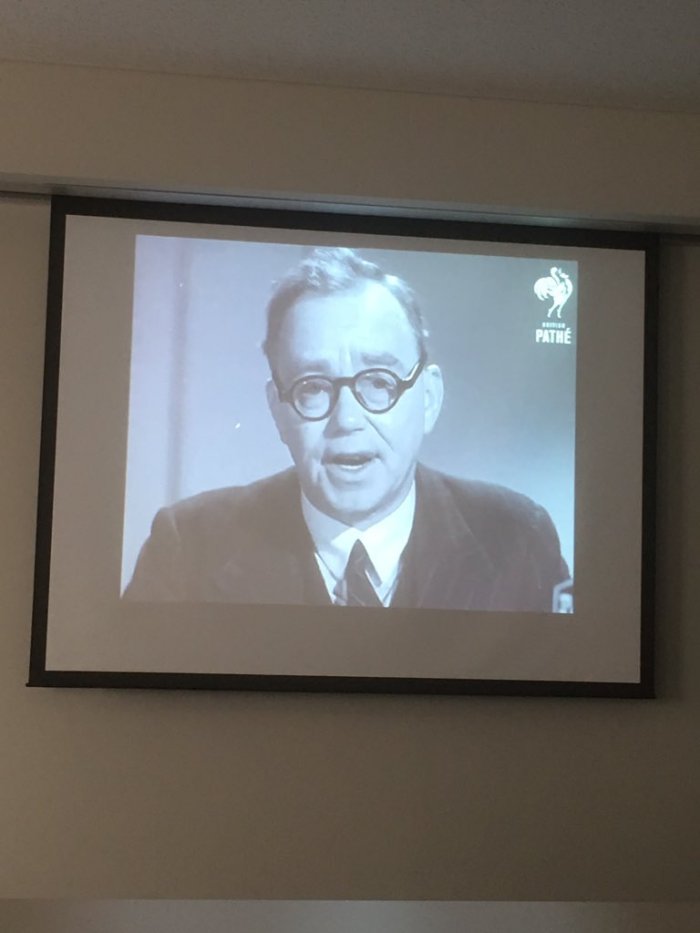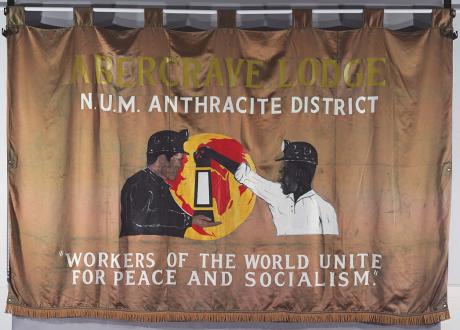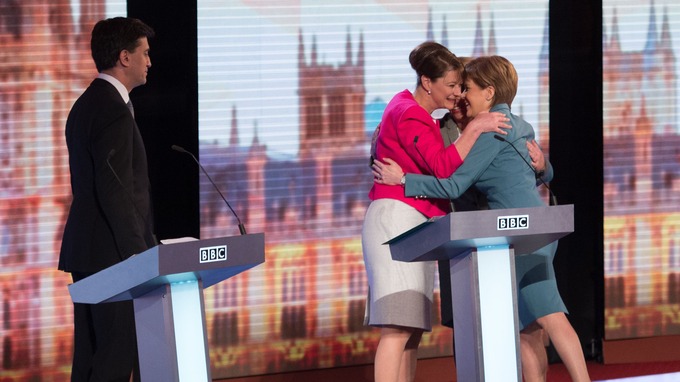 Neil Hamilton addresses the Springbok Club, in front of apartheid-era South African flag
Neil Hamilton addresses the Springbok Club, in front of apartheid-era South African flag
In light of events in the US and the recent protests in the UK, we should be thankful that the rise of the far-right is not so advanced in Wales. Nevertheless, the fact that the Welsh Assembly has a significant UKIP presence makes it an exception in the UK – and suggests there’s every reason to be marching against UKIP as much as against Trump. After last Tuesday’s events at the Senedd (17 January 2017), when Welsh-language pressure group Cymdeithas yr Iaith were informed that an invitation to give evidence to an Assembly committee was being withdrawn, it is becoming increasingly clear that this unchartered territory is proving to be difficult terrain across the political landscape.
Dictating terms?
Cymdeithas yr Iaith, on the basis of prolonged internal discussion, decided as a matter of principle that in the event of providing evidence at Assembly committees they could not endorse UKIP with direct answers. Their reasoning is clear and rational: “UKIP has promoted and tolerated prejudiced attitudes against a number of groups in our society – gay, lesbian, bisexual and trans people, ethnic minorities, migrants, people with HIV – and the Welsh language. We cannot treat them like any other party.”
With the intention of taking this stand at the Culture Committee (where they were to be questioned by UKIP leader Neil Hamilton) they contacted the chair, Plaid Cymru AM Bethan Jenkins, to inform her as a matter of courtesy, but emphasised ‘we don’t want you to change anything regarding the arrangements of the meeting’.
Had Cymdeithas asked that Hamilton not be allowed to put questions to them they would have been in difficulty, as this would not only be providing directives to the Committee as to how to conduct their business. There would also be the more problematic implication of querying his right to ask questions, and therefore his legitimacy as an elected representative.
They asked no such thing, but instead indicated that they would choose to respond to any question in accordance with their collective conscience. Rather than answering the question directly they would outline briefly their stance with regard to UKIP.
The responses from both an Assembly spokesperson and the Chair clearly indicate that they took the view that Cymdeithas had in fact made a direct request to silence Hamilton. “It is not for witnesses to dictate to an assembly committee who is allowed to ask questions,” stated the spokesperson.
Bethan Jenkins stated that she consulted with Committee Members and “the unanimous view of those who responded was that it was for the committee to decide who should ask questions and not witnesses.” These responses reveal how the nature of Cymdeithas’ request has been interpreted, intimating that they had demanded that Hamilton not be allowed to put forward any questions.
This assumption is obviously mistaken. Hamilton’s status, as an AM and member of the Committee, was not questioned; Cymdeithas merely indicated their intention to exercise their presumed right to answer as they saw fit (and without, it should be added, resorting to unreasonable or hateful rhetoric).
Islands of Intolerance
The response throws into doubt the democratic credentials of the Assembly, seemingly debarring a witness on a false assumption. Moreover, it would seem to delineate Assembly committees as fora where our accepted practices and moral norms regarding free speech are put to one side (at the one end of the scale, the accused in court may remain silent, whilst at the other end of the scale, no one would dispute an individual’s right not to answer a question in any given social situation, if they are uncomfortable with the question, or the questioner).
The situation, inevitably, is more complex – in a way that the reply to Cymdeithas fails to recognise, or any subsequent responses have revealed. Clearly the incident necessitates work and reflection, in particular on behalf of Elin Jones as Presiding Officer and her legal advisors, in order to review the Assembly Standing Orders that dictate the rules for Committees.
A great deal turns on the interpretation of the nature of Assembly Committees and how their status has (or hasn’t) been characterised in their regulations. On the face of it, the claim to free speech seems appropriate to symposia that are created in order to discuss and debate issues with a view to collating information to inform policy.
Nevertheless, an understanding of Committees as evidence-collecting bodies aiming at disclosing the truth of a given matter provides a more legalistic interpretation, where legal convention might be seen to dictate that the witness is duty bound to respond directly to the questions put to them. In such a forum, in accepting the invitation they would legitimately be expected to provide evidence for the question in some form – although they would still maintain their right to outline their position on UKIP.
This latter interpretation might seem to inform the assumptions in the response of the Assembly and the Committee, but the relevant sections of the standing orders (17.21; 17.42, 32) do not refer to a situation where a witness refuses to answer. In fact it seems implicit that the Chairperson has a great deal of autonomy in interpreting the regulations and creating rules for their Committee, which would suggest Bethan Jenkins has effectively decided to set a coercive and potentially worrying precedent.
These issues both reveal the work to be done and indicate that the decision made to exclude Cymdeithas yr Iaith was not grounded clearly in Standing Orders. Even if this had been the case there are questions surrounding the treatment of Cymdeithas, and whether they should have been prevented from appearing at the Committee.
In particular, why were they not provided with an opportunity to review their position in face of the assumptions of the Committee, and why was it not explained to them that they (presumably) had the option of voicing their objections to UKIP if they also provided evidence in face of the question? The move to ban them without any further discussion or legal advice (apparently) may be regarded as a rather authoritarian response, and should the Presiding Officers and Assembly lawyers decide they are duty bound to answer UKIP questions directly, at the very least Cymdeithas should have their invite reinstated and given a proper chance to review their options.
However, it is not clear to me that the case would rest there, and here we may be in unchartered territory in the UK (and possibly beyond). More powerful than a claim to freedom of expression and opinion in this context, and perhaps the interpretation which reflects the position of Cymdeithas most accurately, is that this is a question of freedom of conscience. In their view, given their sincerely-held beliefs, responding directly to UKIP is an unconscionable act.
It would be interesting to know whether there is any precedence for this, because in political committees as a rule this question would never arise, given the assumption that those elected politicians asking the questions represent views within the normal, acceptable parameters of British democratic politics. Will the Assembly find in favour of the option, therefore, of such acts of conscientious objection to UKIP?
If they do not, they will in some sense be creating ‘islands of intolerance’ in our Senedd, forcing witnesses to act against their conscience and therefore their own free will, or to forgo the opportunity to provide oral evidence if they give prior notice. The ramifications of this would be significant in terms of Welsh civil society, and groups and individuals who might be invited to give evidence at Assembly Committees.
The Committee Chair claimed in a statement defending the decision that Cymdeithas complaining about having an invitation rescinded undermined the validity of written evidence; but of course, were it not the case that face-to-face debate and discussion provide added value, the committees would not invite parties to give evidence at all, and would only request written submissions. It would clearly create a two-tier system where those who choose to disavow UKIP’s politics would not be given the same opportunity.
There are no doubt groups and individuals who have deep reservations about UKIP in the same way as Cymdeithas, who might like to take a similar line. They would all presumably be debarred from debating and discussing in any Assembly committee. Should they choose to tow the line, in effect Assembly rules would be reducing the capability of Civil Society in Wales to respond to the challenge of the far-right.
The Politics of Intolerance
The response of the Chair has been instructive, and raises questions about the handling of the issue and the wider ramifications. She took to social media to state she ‘could not accept a situation where one group refuses to answer a question from an elected member of the committee’, and retorted to one query with: ‘so Cymdeithas should be allowed to determine which questions to answer and how’.
Both responses seem to offer a rebuttal of the norms of free speech and conscience, and it might be felt by some that they left something to be desired in terms of due respect to members of the electorate. She also questioned why Cymdeithas wished ‘to make an enemy of her’ and referred repeatedly to her record in fighting UKIP, which brings us to the nub of the political issue.
There is a huge question mark regarding not only her behaviour (it is important not to single her out on this because this relates to all AMs who are not in UKIP) but the general tendency in the Assembly towards complicity with UKIP – represented most starkly by the raft of publicity shots of members of all parties happily smiling away with UKIP AMs, sending out the message that despite their politics they should be treated ‘like any other party’.
Most specifically, Jenkins and her colleagues surely realize that such behaviour legitimizes UKIP in a way that means that they will only have to work harder and knock on more doors in future, as their political enemies find their place as an acceptable part of our political landscape.
How can you argue the case effectively that UKIP’s politicians are, for example, charlatans, lazy, and beyond the pale, whilst treating them as ordinary politicians from day to day? In the end, both Plaid and Labour will count the electoral cost, as they have done already (if you want a plausible version of a nightmare Trump scenario, imagine the UK in 2020, debilitated by ongoing Brexit wranglings and economic decline, where an emboldened UKIP storms former Labour strongholds, including the South Wales valleys, leading to a scenario where they could more than double their Assembly vote in 2021 and form a coalition with the Tories).
This is not to say the answers are easy, and indeed these political parties need to work out subtle and efficient ways of undermining UKIP. A step in the right direction would be a sustained attack on their record in the Assembly, far more publicity for their ridiculous and poisonous attitudes, and a more co-ordinated attempt to discredit them. It is our politicians who see them in (or frequently) out of action, and so they have a duty more than most to inform the public of UKIP’s actions.
There needs to be an openness to some of the radical ideas currently being discussed in Wales and elsewhere with regard to how we address the underlying societal and economic issues that have fed the rise of the far right. A more positive message of hope is also needed with respect to our communities, where we look to celebrate our diversity as a society.
Smiling alongside UKIP in photos is certainly no help; working to silence the dissenting voices in civil society is not only morally problematic, it will aid no one’s cause except the far-right. Whatever the outcome with respect to the actions of Cymdeithas, they have shown us that we need not accept without question the politics of the far-right, and there are numerous ways we can oppose them here on the home front.
This is part of a global struggle. Politicians and civil society in Wales have an opportunity to be at the forefront and to set an example. Are we up to it?
Huw Williams
Originally from Dole, near Aberystwyth, Dr. Huw L Williams is a philosopher at Cardiff University. His most recent books include a volume on Welsh intellectual history, Credoau’r Cymry (University of Wales Press, 2016), and a co-authored work with Carl Death, Global Justice: The Basics (Routledge, 2017). A shorter version of this essay has been published in Welsh on Y Twll, https://ytwll.com/
‘On the Far Right on the Home Front’ appears here as a guest blog.







 Neil Hamilton addresses the Springbok Club, in front of apartheid-era South African flag
Neil Hamilton addresses the Springbok Club, in front of apartheid-era South African flag
